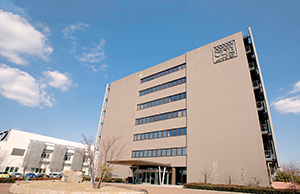Dec. 13, 2013 RIKEN Places Biology
Realizing the potential of regenerative biology
At the heart of biomedical research and innovation in Kobe, the Center for Developmental Biology is in an excellent position to apply its pioneering research to regenerative medicine.
 © 2013 RIKEN
© 2013 RIKEN
The Center for Developmental Biology (CDB) is dedicated to uncovering the fundamental processes that underlie animal development as well as the complex mechanisms involved in organ formation and stem cell and regenerative biology, with the ultimate goal of applying the latest research to regenerative medicine. A core institute for basic research and the inaugural center of RIKEN’s Kobe campus, the CDB was launched in 2000.
Eying stem cell research
Researchers at the CDB have access to supporting laboratories that specialize in mutant mouse production, genetic sequencing and microbial analysis, which helps them to achieve their research aims. Consequently, several CDB projects are at the forefront of stem cell research. For example, building on their work with mouse embryonic stem cells, researchers at the CDB’s Laboratory for Organogenesis and Neurogenesis have induced human embryonic stem cells to self-organize into retinal tissue.
In 2013, the CDB launched a joint clinical study with the Institute of Biomedical Research and Innovation to investigate whether differentiated cell sheets derived from induced pluripotent stem (iPS) cells can be safely transplanted into elderly patients suffering from a degenerative eye disease. Led by the CDB’s Laboratory for Retinal Regeneration, the study takes advantage of the center’s close proximity to hospitals and research institutions that specialize in clinical trials. The CDB’s strategic location at the core of Kobe’s biomedical cluster on Kobe Port Island—home to over 200 biomedical companies—offers many opportunities for collaboration with industry and places the center in an ideal position to translate its research into clinical therapies.
Embracing young talent
With an annual budget of over 3 billion yen, the CDB supports 30 active research laboratories and employs 435 staff members, including 213 women and 43 foreign researchers. The center also hosts postgraduate students and even offers young scientists the opportunity to become principal investigators. The annual CDB Symposium draws an international audience, and seminars throughout the year create regular opportunities for knowledge sharing.
Over the next five years, the CDB will continue to advance research in its core areas of developmental and stem cell biology. Exciting projects are underway in the emerging field of self-organizing embryonic stem cells, and the center is enhancing its use of mathematical methods to better understand the principles that determine an organism’s size and shape.
Additionally, the CDB plans to strengthen and expand mutual partnerships at home and abroad, such as the cooperative research agreements it signed with three Spanish institutes in 2012. Through its summer schools for high school students and Joint International Graduate School Program, the center continues to welcome the next generation of Japanese and foreign researchers. By encouraging a constant influx of new talent and ideas, the CDB will ensure its long-term sustainability and, with it, enduring innovation in the field of developmental biology.
